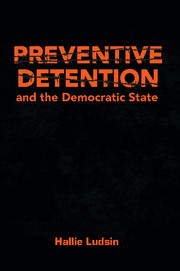Book contents
- Frontmatter
- Contents
- Acknowledgements
- List of Acronyms and Abbreviations
- Introduction
- 1 The Theoretical Framework
- 2 The Policy Debates
- 3 Preventive Detention under International Law
- 4 The History of Preventive Detention in India
- 5 India's Current Preventive Detention Legislation
- 6 India: Preventive Detention and Due Process
- 7 India: The Risk Society and the Slippery Slope
- 8 Preventive Detention in England
- 9 England: Preventive Detention and Due Process
- 10 Preventive Detention in the United States
- 11 The United States: Preventive Detention and Procedural Due Process
- 12 Preventive Detention's Slippery Slope
- 13 Preventive Detention and Liberal Democracy
- Index
13 - Preventive Detention and Liberal Democracy
Published online by Cambridge University Press: 05 March 2016
- Frontmatter
- Contents
- Acknowledgements
- List of Acronyms and Abbreviations
- Introduction
- 1 The Theoretical Framework
- 2 The Policy Debates
- 3 Preventive Detention under International Law
- 4 The History of Preventive Detention in India
- 5 India's Current Preventive Detention Legislation
- 6 India: Preventive Detention and Due Process
- 7 India: The Risk Society and the Slippery Slope
- 8 Preventive Detention in England
- 9 England: Preventive Detention and Due Process
- 10 Preventive Detention in the United States
- 11 The United States: Preventive Detention and Procedural Due Process
- 12 Preventive Detention's Slippery Slope
- 13 Preventive Detention and Liberal Democracy
- Index
Summary
The consequences of the transformation of preventive detention into an ordinary law enforcement tool are already being felt across India, England and the US. So far, these countries have embedded a separate and inferior legal system to manage deviant others and, in doing so, have created a breed of second-class citizens for whom the rule of law has become the rule of suspicion. For the US and England, who have not yet hit the bottom of preventive detention's slippery slope, this is just the start of the damage wrought by the ordinary and regular use of preventive detention as a law enforcement tool. What lies ahead, should they continue their descent to the bottom, is the degradation of the criminal justice system to a secondary justice system, the wholesale substitution of detention for criminal prosecution and ultimately the destruction of their characters as liberal democracies. The cost-benefit analysis that underlies the decision to employ preventive detention fails to consider these costs – costs that should tip the balance away from regular resort to preventive detention and toward greater protections for liberty.
This chapter examines the damage that results from riding down preventive detention's slippery slope. It focuses predominantly on the inferior legal systems for deviant others in India, England and the US to show that not only is preventive detention's harm not hypothetical but that its cost is already too dear for a liberal democracy. Using the analysis from parts I and II, this chapter compares how India, England and the US respond to the policy issues described in Chapter 2 to highlight the second-rate treatment of deviant others and the arbitrariness of the detention regimes. Notably, only India's detention regime unequivocally violates international law. The chapter then delves into other likely consequences to the criminal justice system, rule of law and the liberal democratic character of these countries should they continue toward the bottom of preventive detention's slippery slope. What would be left may not be authoritarianism, since none of these outcomes demand “blind submission” to the government, but neither would it be liberal democracy.
Rights violations and the creation of second-class citizens
The debate over whether detention is criminal punishment or civil regulation is the starting point for assessing the extent to which ordinary and regular use of preventive detention violates the rights to liberty and equality by allowing for the arbitrary detention of deviant others.
- Type
- Chapter
- Information
- Preventive Detention and the Democratic State , pp. 407 - 426Publisher: Cambridge University PressPrint publication year: 2016



